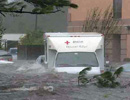| Hurricane Katrina victims whose homes and businesses were destroyed when floodwaters breached levees in the 2005 storm cannot recover money from their insurance companies for the damages, a federal appeals court ruled Thursday. The case could affect tens of thousands of rebuilding residents and business owners in Louisiana, Daniel E. Becnel, who represented 21 plaintiffs in the case, said. Insurers could have taken a "multibillion dollar hit" if the ruling had gone against the industry, said David Rossmiller, an insurance attorney and analyst. "This event was excluded from coverage under the plaintiffs' insurance policies, and under Louisiana law, we are bound to enforce the unambiguous terms of their insurance contracts as written," Judge Carolyn King wrote for a three-judge panel of the 5th U.S. Circuit Court of Appeals. As a result, the panel found those who filed the suit "are not entitled to recover under their policies," she said. More than a dozen insurance companies, including Allstate and Travelers, were defendants. Becnel said he planned to appeal. Xavier University said it would seek a rehearing, insisting the matter is ultimately one that should be decided by Louisiana courts. John Houghtaling, an attorney representing 400 property and business owners in claims against insurers, agreed. He's not involved in this case but is set to argue one with similar issues before a state appeals court next month. He ultimately expects the Louisiana Supreme Court to weigh in on the exclusion issue. "People from New Orleans need to realize this is not final," he said. "This is halftime." King said the federal appeals judges used their "best judgment" in trying to determine how the state's high court would settle the issue if it had the case the panel decided Thursday. The decision overturns a ruling by U.S. District Judge Stanwood Duval Jr., who in November sided with policyholders arguing that language excluding water damage from some of their insurance policies was ambiguous. Duval said the policies did not distinguish between floods caused by an act of God -- such as excessive rainfall -- and floods caused by an act of man, which would include the levee breaches following Katrina's landfall. But the appeals panel concluded that "even if the plaintiffs can prove that the levees were negligently designed, constructed, or maintained and that the breaches were due to this negligence, the flood exclusions in the plaintiffs' policies unambiguously preclude their recovery." "Regardless of what caused the failure of the flood-control structures that were put in place to prevent such a catastrophe, their failure resulted in a widespread flood that damaged the plaintiffs' property," and policies clearly excluded water damage caused by floods, King wrote. This was a consolidated case, including about 40 named plaintiffs, including Xavier University, and more than a dozen insurance companies. It is just one of the cases pending in federal court over Katrina damage. The Army Corps of Engineers faces thousands of claims for damage resulting after the levees breached; King noted in her opinion that dozens more cases, some consolidated and involving property owners suing insurers, are pending in federal court in New Orleans. Rossmiller, who is not involved in Katrina-related litigation, said the appeals panel's ruling wasn't surprising. "The 5th Circuit got it right," he said. "This was an easy one." Representatives of Illinois-based Allstate and Minnesota-based Travelers said their companies were pleased with the court's findings. Insurance companies typically restrict property coverage to damage caused by wind, fire and other hazards. Congress launched the National Flood Insurance Program in 1968 to help homeowners living in flood-prone areas get flood insurance to complement private policies. Private agents sell the federal policies, which are often subsidized by taxpayers because premiums don't factor in the real risks of damage. |





